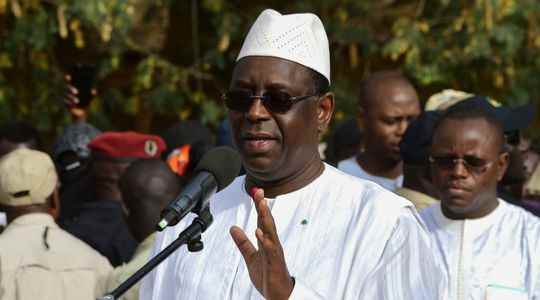Moment of grace or coup de grace? The future will tell what the summer of 2022 was in Macky Sall’s political itinerary. On the international scene, the Senegalese head of state and current president of the African Union has never weighed so much. His June marathon took him from the residence of Vladimir Poutine in Sochi, bordering the Black Sea, to the steps of the Elysée Palace in Paris, passing through Accra and Abidjan, to finish at the foot of the Bavarian mountains, at the castle of Elmau, where the president, guest of the G7, figured prominently in the family photo. At each meeting, the same plea for the continent, collateral victim of the war in Ukraine, plagued by food shortage.
But while Macky Sall carries “the voice of Africa” to the four corners of the world, his star fades at home. Worse, the leader of this West African coastal country (nearly 17 million inhabitants) risks an unprecedented political crisis as the legislative elections of July 31 approach. The heavyweights of the opposition have indeed no chance – a priori – of sitting in the next Assembly of 165 deputies. The list of incumbents of the coalition Yewwi Askan Wi (“Free the people” in Wolof) was rejected, on the grounds that one of the candidates was also on the list of alternates.
“This decision is a legal curiosity, underlines Maurice Soudieck Dione, professor of political science at Gaston-Berger University in Saint-Louis. Why invalidate the list displaying all the tenors rather than that of the substitutes? see it as a way to weaken the opposition, when the scenario of cohabitation was probable and feared by the majority, in a difficult economic context. The standoff will take place at the polls with this list n°2, but it has also won the street, where demonstrations have resulted in the death of three young people on June 17.
authoritarian drift
The stability of this country, often presented outside as a model of democracy in the region, is once again put to the test. “Senegal’s history shows that all the regimes in place since Léopold Sédar Senghor worked, at first, to maintain their hegemony. This period lasted on average eight years, before the president was forced to open the political game under pressure, resumes Maurice Soudieck Dione. The problem is that Macky Sall, in power for ten years, takes the opposite path, in an authoritarian drift.
To “reduce the opposition to its simplest expression”, as he himself formulated it in 2015, the president has co-opted as many personalities as possible to overshadow him. His biggest catch? Former Prime Minister Idrissa Seck. Coming second in the 2019 presidential election, he “returned to the ranks” through the front door in November 2020, when Macky Sall appointed him president of the Economic, Social and Environmental Council, the fourth highest office in the state.
As for the other opposition figures, all or almost all have had to deal with justice in recent years, in sometimes decried conditions. The trial of Karim Wade (the son of ex-president Abdoulaye Wade), convicted in March 2015 of illicit enrichment, was deemed unfair by the UN human rights committee. Just like that of the former mayor of Dakar, Khalifa Sall, sentenced to 5 years in prison in 2018 for embezzlement of public funds (and pardoned in 2019). Finally, the procedure against Ousmane Sonko, the leader of the Yewwi Askan Wi coalition accused of rape, is still ongoing.
The temptation of the third term
The latter, who screams conspiracy, assures him: the head of state only thinks of running for “a third forced term” in 2024. Sonko is not alone in thinking so. “Macky Sall obviously has a political agenda to stay in power,” slips the minister of a neighboring state, citing a recent episode. At a meeting in Ghana on June 4 with the leaders of the Economic Community of West African States, the Senegalese president refused to sign a text setting in stone the two-term limit for the 12 member countries.
In Senegal, the Constitution is however clear: “No one can exercise more than two consecutive mandates.” Macky Sall had sworn, in his autobiography published in 2019, Senegal at heart, that he was seeking “his second and last term” at the time. Since then, the president has maintained the greatest vagueness. Will he say, like his predecessor Abdoulaye Wade, “ma waxoon waxeet” (“I said it, I retract myself”)? It was in 2011. “Master Wade”, also tempted by a third mandate, had then aroused a popular revolt. And signed the end of his career.
